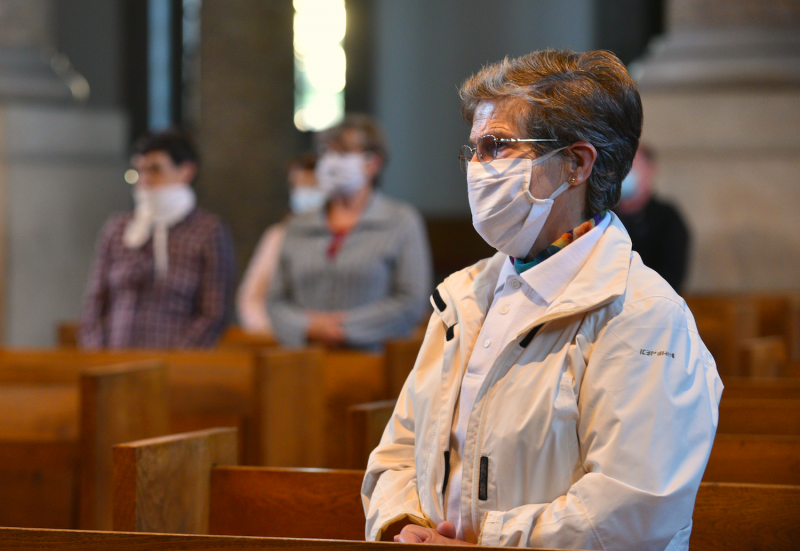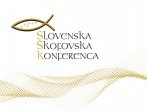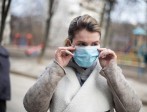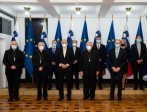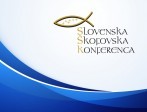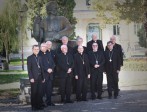Slovenian bishops call on priests, religious sisters and brothers, pastoral workers and all Catholics to respect the measures of the Government of the Republic of Slovenia and the NIJZ (NationalInstitute of Public Health) to prevent the spread of the COVID-19 epidemic. On November 12, 2020, based on the Communicable Diseases Act, the Government adopted the Act amending theOrdinance on the temporary partial restriction of human movement and the restriction or prohibition of gathering people to prevent SARS-CoV-2 infections (Official Gazette of the RS, No. 163/20), according to which gatherings of people are temporarily prohibited. To avoid possible inspections, police controls and financial penalties, bishops call on all priests to take the following measures from Friday, November 13, 2020, until revoked.
1. Bishops invite all believers, priests, religious sisters and brothers, and Catholic lay movements to intensify their prayer for health, for the sick, health workers, blessing of our nation, and for an end to the pandemic.
2. Holy Masses with the community are cancelled until further notice. Private masses of a priest without believers are allowed (except for members of a shared household who live, for example, in a parish or monastery).
3. Bishops grant all believers who are unable to attend Holy Masses on Sundays a dispensation from the obligation of a Sunday Mass (cf.Code of Canon Law, can. 1245).
4. The faithful should follow Sunday Holy Masses in the media, receive spiritual communions, devote their time to prayer, read the word of God and do good deeds (cf. Code of Canon Law ZCP, can. 1248, § 2). Priests are encouraged to broadcast Sunday Holy Masses online before or after the Holy Mass at 10 a.m. At 10 a.m., the faithful should be invited to watch the Holy Mass on TV Slovenia or Radio Ognjišče.
5. By prior agreement with a priest, the Holy Communion (receptionof Holy Communion outside a Mass) is allowed to be shared only individually - to one believer, a family or members of the same household. In such a case, a believer makes a prior arrangement with a priest by phone or e-mail about the time of reception of a blessing and a communion in a church, chapel or another suitable place. Participation in individual communion is allowed only to healthy believers who do not have symptoms of respiratory infection, do not cough and do not have a fever. It is recommended that all priests and believers have the #Ostanizdrav app installed on their phones.
6. Until further notice, only private prayer of one believer or one family or members of the same household is allowed in a church.
7. Confession is allowed only by prior arrangement. In confessionals, adequate protection must be installed between a priest and a confessor (e.g. PVC foil) and a distance of 1.5 meters must be ensured. The confessional should be regularly ventilated and cleaned. Before entering the confessional, a confessor must disinfect their hands and put on a mask. Confession via telephone and online is expressly prohibited, as secrecy is not guaranteed. Priests and believers are obliged to respect this norm. The regular form of confession is a personal confession.
8. Holy baptisms, first holy communions, confirmations and church weddings are postponed until further notice. A Holy Baptism can exceptionally be granted to an individual in a circle of members of the same family or the same household.
9. Anointing of the sick is permitted if a priest and a patient are adequately protected (masks of N95/KN95/FFP2/FFP3 types). Priests who take care for the sick and priests who take care for the elderly in old people’s homes and other similar institutions must follow the instructions of the said institutions for the prevention of infections and obtain appropriate protective equipment from them. A priest should wear a mask during a visit in a patient’s home and disinfect his hands before and after a visit. Visiting patients in their homes on First Fridays are allowed.
10. Church funerals are performed in agreement with funeral services and compliance with all instructions of NIJZ. A certain family or members of a shared household may be present at a funeral.
11. Catechesis (religious instruction) and other forms of pastoral activity are performed by distance learning.
12. A parish office may be open for one person or a family or one household at a time. A priest and a believer should wear a mask and disinfect their hands before and after a visit.
13. Until further notice, all permits for spiritual seminars and lectures given by bishops, priests, religious sisters and brothers and lay people from Slovenia or abroad have been revoked.
14. Charitable institutions shall act under the instructions issued by their management, subject to national regulations.
The parish priest or the responsible person is responsible for possible violations of government decrees and sectoral legislation. In the event of an inspection procedure or police action, the responsible person should report it to the SBC Secretariat as soon as possible to the e-mail address: [email protected].
The measures taken shall remain in force until revoked. If the state of health deteriorates and state instructions become stricter, each bishop ordinary will adopt additional restrictions in the field of religious or liturgical life of parishes for his diocese. Priests and other pastoral workers are kindly requested to publish the instructions on parish websites and social networks. Additional information is published on the SBC website: https://katoliska-cerkev.si.
These instructions enter into force on Friday, November 13, 2020. These instructions terminate the Instructions of Slovenian Bishops during the COVID-19 epidemic, which have been in force since October 16, 2020.
Msgr. Stanislav Zore, Metropolitan Archbishop of Ljubljana and President of SBC
Msgr. Alojzij Cvikl, Metropolitan Archbishop of Maribor and Vice President of SBC
Msgr. PhD Jurij Bizjak, Bishop of Koper
Msgr. PhD Peter Štumpf, Bishop of Murska Sobota
Msgr. Andrej Glavan, Bishop of Novo mesto
Mr Rok Metličar, diocesan administrator of the Diocese of Celje

